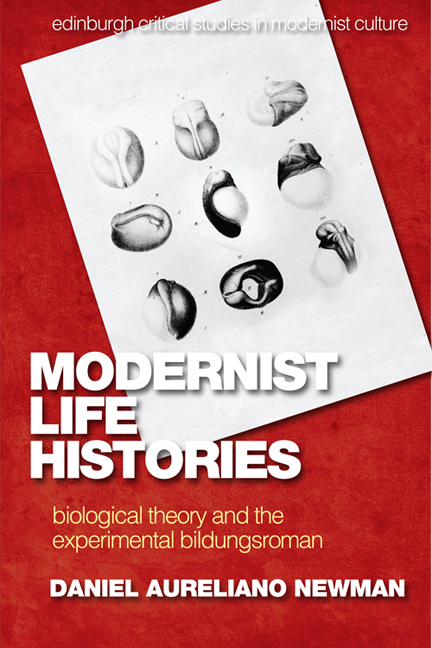Book contents
- Frontmatter
- Contents
- List of Figures
- Preface
- Acknowledgements
- Series Editors’ Preface
- List of Abbreviations
- Introduction
- 1 Bildung, Biology and the Narrative Structure of Development
- 2 A Portrait of the Artist as a ‘Biologist in Words’: Language, Epiphany and Atavistic Bildung
- 3 Mendelian Inheritance, ‘Eternal Differences’ and Entropy in Howards End
- 4 ‘Tampering with the Expected Sequence’: Heterochrony and Sex Change in Orlando
- 5 Anachrony, Neoteny and the ‘Education of an Amphibian’ in Eyeless in Gaza
- 6 Beginning Again: Darwin’s Caterpillar from George Eliot to Beckett
- Conclusion
- Bibliography
- Index
3 - Mendelian Inheritance, ‘Eternal Differences’ and Entropy in Howards End
Published online by Cambridge University Press: 23 April 2021
- Frontmatter
- Contents
- List of Figures
- Preface
- Acknowledgements
- Series Editors’ Preface
- List of Abbreviations
- Introduction
- 1 Bildung, Biology and the Narrative Structure of Development
- 2 A Portrait of the Artist as a ‘Biologist in Words’: Language, Epiphany and Atavistic Bildung
- 3 Mendelian Inheritance, ‘Eternal Differences’ and Entropy in Howards End
- 4 ‘Tampering with the Expected Sequence’: Heterochrony and Sex Change in Orlando
- 5 Anachrony, Neoteny and the ‘Education of an Amphibian’ in Eyeless in Gaza
- 6 Beginning Again: Darwin’s Caterpillar from George Eliot to Beckett
- Conclusion
- Bibliography
- Index
Summary
The garden of a shepherd's cottage swallowed up in a deer-forest lost all trace of its previous cultivation and became a weed-ground. After many years it was delved, and soon there appeared many different kinds of old-fashioned flowers whose seeds had lain dormant for several generations. So may ancient flowers and weeds now and again reappear out of latency in that garden which we call our inheritance.
– J. Arthur Thomson, Heredity (1912: 124)Proponents and antagonists of recapitulation theory agreed that the link between development and evolution is heredity, but their agreement ended with the question of hereditary mechanisms. Recapitulation theory almost inevitably assumes Lamarckian inheritance, which, as we saw in Chapter 1, makes development and genealogy coextensive; Mendelism, by contrast, radically separates them. In theory, the difference between the two hereditary paradigms should have profound implications for the Bildung plot. In practice, novelists rarely have a genetic vision fine-grained enough to affect narrative dynamics in any detectable way, even when heredity plays an important thematic role.
A significant exception is E. M. Forster, whose fiction repeatedly pits hereditary transmission against Bildung, as the protagonists of The Longest Journey and Maurice learn the hard way. Similar issues mark most of Forster's fiction. If this claim seems counterintuitive, it is because modernist and queer studies, which have so productively mined the complexities of Forster's fiction, tend to favour affiliative over filiative dynamics. Forster's focus on reproduction, meanwhile, enjoys little attention, though it is evident even to casual readers. ‘Birth’ was one of Forster's theoretical concerns (AN 36) and a recurrent theme and structuring principle in his fiction. Where Angels Fear to Tread, The Longest Journey, A Passage to India and Howards End all include or anticipate the arrival of babies, but this feature tends to be overlooked or dismissed as an aspect of his heterosexist surface plots. As John Beer puts it, ‘homosexuality gave [Forster] an “outsider’s” view of things, making him look at the world from a point of view which did not regard marriage or the procreation of children as central’ (qtd in Martland 1999: 20). What is central, according to such interpretations, is the ‘struggle for heirs of same-sex lovers’ (Malik 1997: 230), ‘the problem of continuity without physical begetting’ (Martin 1997: 257).
- Type
- Chapter
- Information
- Modernist Life HistoriesBiological Theory and The Experimental Bildungsroman, pp. 80 - 107Publisher: Edinburgh University PressPrint publication year: 2018



